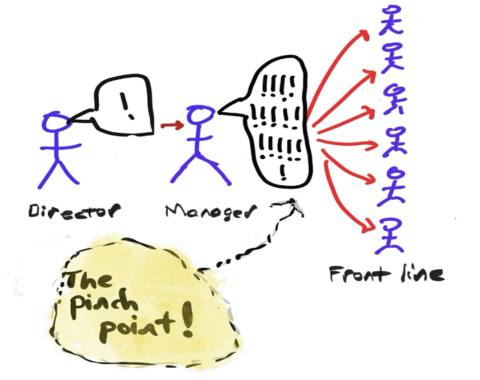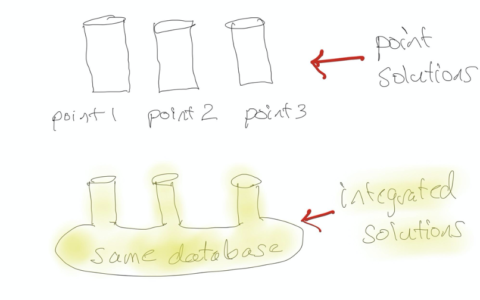The management gap in healthcare is a mile wide
It can be summarized quickly: even though the objectives can be obvious, some metrics never improve (much). Or, more precisely, there is a gap in the translation of organizational priorities into individual management actions. Since change requires action, this can leave health systems wooden and slow when they need to be nimble and fast. Most every health system has “fallen” into this gap when translating leadership priorities into frontline actions.
Information and reports are not the problems
Health systems are inundated with information and reports. However, rallying thousands of front-line employees to behave differently — on the basis of informed data — that’s the hard part. Especially when time is at a premium.
Some have tried to fix the healthcare management gap. Survey platforms, engagement platforms, performance management systems, talent platforms. But they all fail because the information is not translated into the next best action, on a daily basis. So everyone can see the problem but very few know exactly what to do, or at least, who to focus on first. And even if these platforms were able to identify the next best action, they all ignore the most important point: these recommendations need to be put into existing manager workflows.
The front-line manager is super important in this dynamic because they are perhaps the most over-laden health system employee. They are also the major pinch point in creating change. Through conducting hundreds of interviews, we’ve established that managers are not going to embrace something new unless it’s integrated with their other workflows, saves them time, and delivers best practices. Managers simply do not have the right tools today to do their challenging jobs.
Best practice diffusion is essential because management processes, as of now, are quite variable. Managers are just too busy to do this organically. And it’s not their fault — there has been a lack of management training, the spans of control are large, and there are plenty of other important priorities. So, all-too-often we resort to the old ways: announcements at staff meetings, email blasts, and the like. Every manager eventually finds their own way. Some are more effective than others, but the best practices rarely get shared. There is no integrated system.
Point solutions versus integrated systems
Point solutions, which hope to bridge this gap, like survey tools, can be almost worthless. Sure, they solve a localized problem, but then they make it all worse by creating yet another silo of data, which only increases frustration. If you have a recognition system but it does not tie into the employee profile and HRIS, what use is it?
If you need a system for checking in or employee rounding but it does not link to the time and attendance system, how does it save time? If you conduct a survey but the data remains in a silo and is not translated into a management action, why even do it in the first place? I hope that the days of these types of point solutions are over.
With integrated solutions, managers can become 10x more powerful and can save time, solving many of the frustrating aspects of frontline management. We have the insights. But improving also requires change, and change requires action. Recommended actions are the missing part of the performance loop that we need to spin. Identify the opportunity, take action, and refine, then identify the next opportunity. This is how many intelligent systems work, like automated thermostats. It all happens in seconds, and it is easy for the user. It gets better and smarter over time, as you train it. Where is this in healthcare? How can we work with managers to solve this gap in a way that elevates the manager?
At Laudio we are working on solving this gap, and are very excited to share our progress.
To learn more about Laudio solutions contact us at Sales@Laudio.com.

